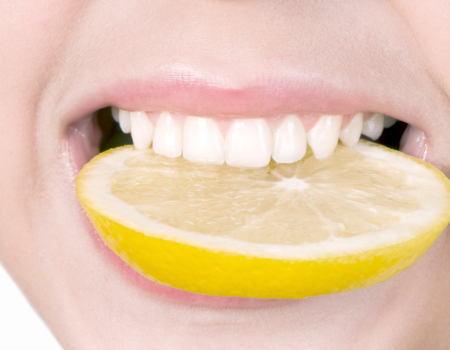
Do Lemons Work for Teeth Whitening?
Lemons contain citric acid, which one blog post claims kills bacteria to whiten teeth. However, teeth stains come from pigments in what you eat and drink—not bacteria. Regular flossing and brushing remove plaque and bacteria.
Will Lemons Eventually Damage Teeth?
Applying lemons juice, peels, or oils to your teeth will eventually damage them because it repeatedly exposes them to acid. But that is true of any excessive acid exposure on your teeth.
Darker Tooth Enamel
The blog post also mentions that lemons might eventually darken teeth. But the darkening doesn’t come from thinning tooth enamel, as the article suggests. Citric acid etches teeth enamel, roughens it, and causes teeth to attract stains.
Thinner Tooth Enamel
Sucking on lemons or rubbing acidic peels on your teeth will thin tooth enamel. The same occurs with bulimia when stomach acid from vomiting repeatedly comes in contact with teeth.
Beware of Teeth Whitening Kits with Citric Acid
Some teeth whitening kits may contain citric acid to etch tooth enamel, creating a frosty surface on teeth. The whitening kits may include a titanium dioxide substance with a white pigment attached to the etched tooth enamel. When the titanium dioxide wears off in a few days, the result is darker teeth in the long term. However, the tooth enamel is still rough, which increases the risk of attracting stains.
Conclusion
Do-it-yourself teeth whitening—including whitening with lemons—is risky. Although Crest Whitestrips will give you some improvement, it is less effective than professional whitening from a dentist.
